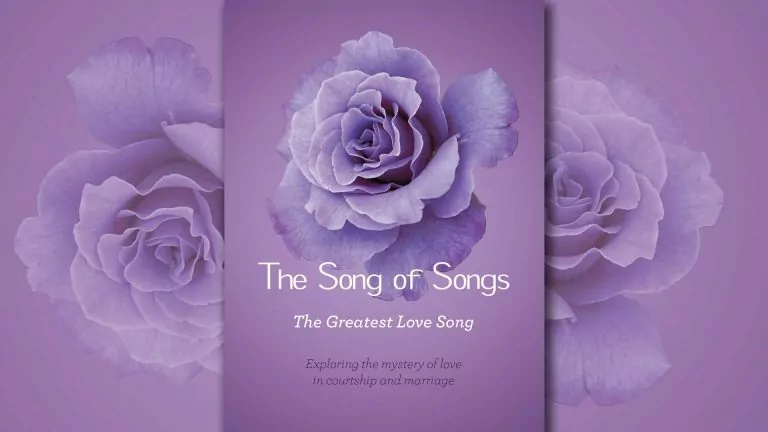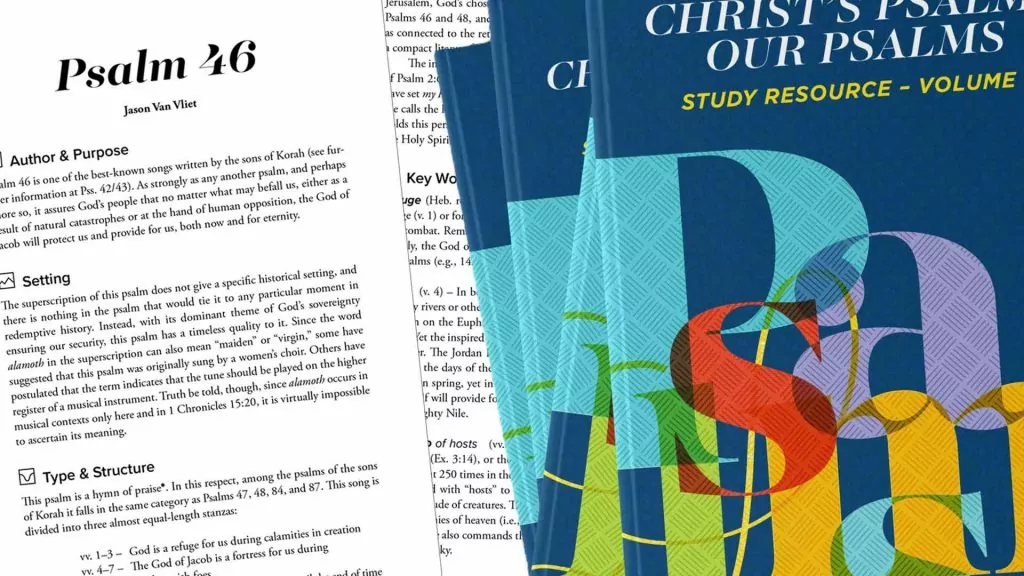ON PSALM 46: an excerpt from "Christ's Psalms, Our Psalms – Study Resource"
What follows is an excerpt, on Psalm 46, from the new commentary "Christ's Psalms, Our Psalms - Study Resource." Written by pastors, it is meant as a resource for the everyday reader of the Psalms to better understand how they relate to Christ and to ourselves. The commentary's Christological focus sets it apart, though, as the editor Rev. Peter Holtvlüwer has noted, the pastors take care never to "dream-up links to the Saviour but to base their conclusions on sound grammatical-historical exegesis."
As you can see it what follows, the resource makes use of 16 different headings, to allow the busy reader to easily find the particular information they are looking for.
If you've appreciated this peek at Psalm 46, be sure to order "Christ's Psalms, Our Psalms - The Study Resource" right here.
*****
1. Author & Purpose
Psalm 46 is one of the best-known songs written by the sons of Korah (see further information at Pss. 42/43). As strongly as any another psalm, and perhaps more so, it assures God’s people that no matter what may befall us, either as a result of natural catastrophes or at the hand of human opposition, the God of Jacob will protect us and provide for us, both now and for eternity.
2. Setting
The superscription of this psalm does not give a specific historical setting, and there is nothing in the psalm that would tie it to any particular moment in redemptive history. Instead, with its dominant theme of God’s sovereignty ensuring our security, this psalm has a timeless quality to it. Since the word alamoth in the superscription can also mean “maiden” or “virgin,” some have suggested that this psalm was originally sung by a women’s choir. Others have postulated that the term indicates that the tune should be played on the higher register of a musical instrument. Truth be told, though, since alamoth occurs in musical contexts only here and in 1 Chronicles 15:20, it is virtually impossible to ascertain its meaning.
3. Type & Structure
This psalm is a hymn of praise*. In this respect, among the psalms of the sons of Korah it falls in the same category as Psalms 47, 48, 84, and 87. This song is divided into three almost equal-length stanzas:
1–3– God is a refuge for us during calamities in creation
4–7– The God of Jacob is a fortress for us during combat with foes
8–11– The God of Jacob is a fortress for us until the end of time
Each stanza is demarcated with the transliterated word selah*. In addition, the second and third stanzas culminate in an identical refrain: “The LORD of hosts is with us; the God of Jacob is our fortress” (vv. 7, 11). The third stanza is unique in that it contains a direct address from God to us whereas in the rest of the psalm we address God.
4. Poetic Elements
This psalm is filled with unforgettable poetic imagery. Mountains plunge into the sea. The earth itself melts. Bows break and spears shatter. The Holy Spirit saturates our minds with one vivid word picture after another. He also pulls the psalm together through various repeated verbs. The mountains are “moved” (v. 2), but Jerusalem “shall not be moved” (v. 5), even though the kingdoms “totter” (v. 6). In each case the same Hebrew verb is used. Similarly, just as surely as the waters “roar” (v. 3), so also the nations “rage” (v. 6). Again in the original the same word is used. Parallel lines also contribute to the tight, cohesive structure of this psalm. “The city of God” is in line with “the holy habitation of the Most High” (v. 4), and knowing that “the LORD of hosts is with us” gives all the more weight to the expression “the God of Jacob is our fortress” (vv. 7, 11).
5. Placement within the Psalter
In 44:4 the sons of Korah made a personal confession that we all should echo: “You are my King, O God.” This acclamation of God as our royal head continues in Psalm 45. These “verses to the king” (v. 1) portray an elaborate royal wedding ceremony. Furthermore, under the LORD’s blessing this royal couple will receive royal children and so begin a dynasty with many princes all over the earth (v. 16). Indeed, from nation to nation and from generation to generation, the name of the King will be remembered.
At the same time, the nations will not naturally come to the point of exulting in the LORD. Quite the opposite, they will have to be brought to this point. For this reason, before the “princes of the people gather as the people of the God of Abraham,” as we hear in 47:9, the LORD must do something to subdue them in Psalm 46. Though these nations may roar against the King of kings, his people, and his city (v. 6), the God of Jacob will silence them and insist upon his divine prerogative to be exalted among the nations (v. 10). To sum up, then, the royal expectation of 45:17 becomes a wonderful reality in 47:9 but only through the mighty decree and work of the LORD in 46:10.
In addition, Psalms 46–48 form a sub-unit of psalms that focuses on Jerusalem, God’s chosen city. This focus on the city of our God is explicit in Psalms 46 and 48, and if we take into consideration the setting of Psalm 47 as connected to the return of the ark to Jerusalem, then all three psalms form a compact litany of praise from within the walls of Zion to the God of Zion.
The interrelated themes of Zion and kingship combine to serve as an echo of Psalm 2:6 where both are mentioned right beside each other: “As for me, I have set my King on Zion, my holy hill.” Notice how both are dear to the LORD. He calls the king “my King” and he identifies Zion as “my holy hill.” Since he holds this person and this place near to his heart, it is not at all surprising that the Holy Spirit expands on these themes in this section of the Psalter.
6. Key Words
Refuge (Heb. root ḥsh, 1); fortress (vv. 7, 11) – Normally speaking, a refuge (v. 1) or fortress (vv. 7, 11) is a place where people are safe from calamity and combat. Remarkably, in this psalm the refuge is not a place but a Person, namely, the God of Jacob. Finding our refuge in God is a common theme in the Psalms (e.g., 14:6; 61:3; 62:8; 73:28).
River (v. 4) – In both the ancient and modern worlds people tend to build cities by rivers or other large sources of fresh water. Think of Cairo on the Nile, Babylon on the Euphrates, New York on the Hudson, and Vancouver on the Fraser. Yet the inspired irony here is that Jerusalem is not situated on the banks of a river. The Jordan River is about thirty kilometres to the east of the city walls. In the days of the sons of Korah, Jerusalem’s main source of water was the Gihon spring, yet in faith they trust that since the LORD is in their midst he himself will provide for them as abundantly as if their city sat on the banks of the mighty Nile.
The LORD of hosts (vv. 7, 11) – God’s personal name is Yahweh, or I AM WHO I AM (Ex. 3:14), or the LORD, as it is often printed in our Bible translations. About 250 times in the OT and twice in this psalm God’s personal name is combined with “hosts” to form Yahweh Sebaoth. A host is a big army or a large multitude of creatures. Thus, the LORD of hosts is the supreme commander of the armies of heaven (i.e., the angels) and all the nations and creatures on the earth. He also commands the heavenly hosts, which are the billions of stars in the night sky.
7. Unusual Words or Expressions
Very present help (v. 1) – Literally this verse speaks of help that is easily found. You don’t have to go searching high and low for God’s help. He is always right at hand, ready to help whenever and wherever his people need his assistance.
Heart of the sea (v. 2) – This poetic expression describes not only the deepest part of the sea (Ezek. 27:27) but also possibly a geographical point that is far away from the shore of the sea (Ezek. 27:25). Today we might say “in the middle of the sea.”
Earth melts (v. 6) – The verb used here means either “to totter” (cf. 75:4) or “to melt” (cf. Jer. 49:23). In either case the earth, which is normally so stable, now becomes utterly undone simply at the voice of God. This same God has set a day on which heaven and earth and its very elements will be dissolved by fire (2 Peter 3:10, 12).
8. Main Message
Summing up the message of this psalm in one sentence, we might put it this way: God is our fortress, therefore we need not fear. Although many psalms serve as an antidote to anxiety, this psalm does so in a particularly powerful way because each stanza provides another layer of assurance until, by God’s grace, we walk away with a calm and confident heart.
The first stanza sets calamities in creation before our eyes. In fact, the sons of Korah highlight some of the most extreme events one could imagine. Throughout the course of history there have been terrible windstorms, violent earthquakes, overwhelming floods, and horrific plagues, but the terra firma remains firm. Added to that, centuries, yes, millennia have passed but Mount Baker is still Mount Baker and Mount Everest is still Mount Everest. However, what if that all changed one day? What if the earth itself gave way (v. 2a) and melted (v. 6)? What if the seemingly unmovable mountains were picked up and tossed into the middle of the sea (v. 2b)? Or what if such a furious tsunami crashed ashore that even the solid granite mountains began to shiver and tremble (v. 3)? Obviously, these are extreme events, not unlike those things that the Lord has prophesied concerning the last days (e.g., Isa. 24:18; 2 Peter 3:10–12). Yet even if such cataclysms begin to occur, God’s people can confess, “We will not fear” (v. 2). Is this unfounded bravado? No, this is confidence that comes from acknowledging the God of all creation as “our refuge and strength” (v. 1). Even cataclysm comes “not by chance but from his fatherly hand” (LD 10), so God’s people can find in him a refuge that is greater than the most extreme disaster.
The second stanza shifts our attention from the raging seas to the quiet waters of a river with its streams. There is a deep irony in water. When it rises and rages (v. 3a) it can cause destruction and death. Yet when it flows gently it sustains life, refreshes the parched tongue, and even gives joy to an entire city (v. 4). The city in view in this psalm, though, is not just any city; it is God’s city, his holy habitation, the city of Jerusalem. The river being described is not just any river. As explained above (see Key Words), Jerusalem did not have a large, natural river flowing within walking distance of its houses yet in faith the citizens of this city confess that since “God is in the midst of her” (v. 5), they will surely receive all that they need from his hand, especially the still waters that restore the soul and symbolize regeneration for the entire person (cf. Ps. 23:2–3; Titus 3:5). With this truth implanted in our hearts, God’s people do not even need to fear mighty armies or fierce nations that may march against them. The God of Jacob, the Chief Cosmic Commander, before whom no enemy can stand, only needs to speak once and the very earth itself will melt (v. 6). Since he is our fortress, we are assured that no sword or soldier will separate us from the love of God in Christ (Rom. 8:35).
The third stanza pulls together the LORD’s sovereignty over creation (“desolations on the earth,” v. 8) and all armies (v. 9). In fact, the LORD is so comprehensively sovereign that he can not only direct the outcome of a war, but he can defeat war itself so that even battles themselves become obsolete (v. 9). This last stanza also contains a dramatic pause as the LORD of hosts himself speaks. All must be silent before this almighty God. All must be silent, humble themselves, and exalt him. God’s people too must be silent and set their anxieties aside knowing that with the God of Jacob as our fortress (v. 11), we need not, and will not, fear (v. 2). Believers today have even more reason to be confidently calm since our Saviour has ascended the throne at God’s right hand, been given the name above every name, rules over all authorities, and will one day hear every tongue confess him as Lord (Phil. 2:9–11).
9. Christ Connection
The connections between Psalm 46 and our Saviour Jesus Christ are numerous. In the first place, there is a direct line between the refrain of this psalm and one of the names of our Saviour. Both in verse 7 and 11 we are assured that “the LORD of hosts is with us” (emphasis added). Not only does this assurance resonate with what the LORD says elsewhere in the OT (see next section), but it also reaches forward to the name Immanuel, which the prophet Isaiah already announced concerning the son of the virgin in Isaiah 7:14 and which the angel confirmed as a name of our Saviour in Matthew 1:23. Indeed, in Christ the comfort of God’s presence with us reaches an entirely new level. In the OT God was always present with his people, but in the NT the Son of God became flesh (John 1:14) and “took upon himself true human nature from the flesh and blood of the virgin Mary” (LD 14). In this way the Son of God was not only with us but also became one of us, “like his brothers in every respect” (Heb. 2:17) and “yet without sin” (Heb. 4:15).
Secondly, the sons of Korah begin by describing God as “a very present help in trouble” (v. 1). This means that God’s help is easy to find. Human beings naturally conclude that since God and we are so different, it must also be difficult to find him and speak to him. Jesus Christ taught us differently when he said, “I am the way, and the truth, and the life. No one comes to the Father except through me” (John 14:6). In addition, since Christ is both God and man, we can confidently draw near to the throne of grace at any given moment and be assured that “we may receive mercy and find grace to help in time of need” (Heb. 4:16). BC 26 explains in a deep and moving manner that with God’s own Son as our intercessor, divine help is always close at hand.
Finally, Psalm 46 presents a striking image of the city of Jerusalem with a river flowing from it or at least near it (see Key Words above, as well as Ezek. 47:1–6 and Rev. 22:1–2). It goes without saying that water is essential for life. However, there is physical life, common to all, and also the new, spiritual, heavenly life, given only to God’s chosen ones (BC 35). Yet although cisterns and streams give us ordinary water that is necessary for physical life, Christ alone gives us the special, spiritual water that sustains the new life that leads to eternal life. As Jesus Christ told the woman at the well of Sychar, “Whoever drinks of the water that I will give him will never be thirsty again” (John 4:14). And, as Christ later explains, this special “living water” refers to the Holy Spirit (John 7:38–39).
10. Old Testament Links
Just as we hear in verses 7 and 11 in this psalm, so the LORD himself has repeatedly assured his people that he is with them, with his power and his grace, through good times and bad. This reassurance ought to quiet our fears. For example, when Moses felt too inadequate and too scared to confront Pharaoh, the LORD assured him: “I will be with you” (Ex. 3:12). Similarly, when Joshua faced the seemingly insurmountable task of leading God’s people over the Jordan, into the Promised Land, and onto the battlefield against fierce nations defending their home turf, the LORD also encouraged him saying, “Be strong and courageous. Do not be frightened, and do not be dismayed, for the LORD your God is with you wherever you go” (Josh. 1:9).
The blessing of having a river nearby is also found elsewhere in the OT. Already the garden of Eden was watered by a river that divided into four headwaters (Gen. 2:10–14). Moreover, even if the actual city of Jerusalem did not have a large river beside it, the eschatological Jerusalem, described by the prophet Ezekiel, certainly did, symbolizing the life-giving power that flows from the LORD and his temple (Ezek. 47:1, 5).
11. New Testament Links
The same theme of the Lord’s abiding presence returns in the NT at a most significant point in redemptive history: the ascension of our Lord Jesus Christ. Commentators and preachers alike have paid much attention to the Great Commission, “Go therefore and make disciples of all nations” (Matt. 28:19), yet comparatively less consideration has been given to the words that follow immediately thereafter: “And behold, I am with you always, to the end of the age” (Matt. 28:20). Given the calamities and persecutions that we read about in the book of Revelation and that are occurring or will yet happen, these words of our Saviour, echoing the refrain of Psalm 46, are an immense comfort.
The river theme of the OT, including Psalm 46, finds its final and most spectacular fulfillment in the river that flows with the water of eternal life in Revelation 22, water that is “bright as crystal, flowing from the throne of God and of the Lamb” (v. 1).
12. Confessional References
BC 27 uses verse 5 (“God is in the midst of her; she shall not be moved”) to substantiate its conviction that the holy church of Christ “is preserved by God against the fury of the whole world.” To be sure, this is an appropriate reference. A rapid glance through the pages of church history should be enough to convince any alert reader that if the God of Jacob were not the fortress of his church, she would have died and been buried in the dust long ago.
13. Scriptural Themes
Creator/Creation– The God who created the mountains (Gen. 1:9) can also throw those very same mountains into the heart of the sea (v. 2). The God who separated the waters (Gen. 1:6) is more than able to provide a river’s worth of water to a city that has only one big spring (the Gihon) as its water source (v. 4). This psalm vividly affirms the Creator’s comprehensive control of his creation.
God’s Sovereignty– The God of Jacob is sovereign over creation (vv. 1–3) and over the nations (vv. 4–7). Indeed, his divine rule will be acknowledged and exalted throughout the entire earth (v. 10).
God’s Kingdom– Although the terms “king” and “kingdom” do not occur in this psalm, God’s own decree that he will be exalted among the nations (v. 10) clearly implies his kingship.
God’s Covenant (of grace) – The prominent reference to God’s covenant name, Yahweh (LORD), in “Yahweh Sebaoth,” at the end of the second and third stanzas reminds us that the doctrine of the covenant undergirds this psalm as well.
God’s Grace– He who is our “very present help in trouble” (v. 1) is certainly a kind and gracious God.
God’s Church– The city of God (v. 4), otherwise known as Zion or Jerusalem, is not only a location on a map but a dwelling place for God’s people. In this way, the city of God in the OT symbolizes the church of God in the NT.
Antithesis– Though the nations may rage against God and his holy city, the LORD of hosts will protect his people as their refuge, fortress, and ever-present help (vv. 5–7).
Man’s Depravity – Nothing noteworthy.
Justification – Nothing noteworthy.
Sanctification – Nothing noteworthy.
Mission/Outreach – Nothing noteworthy.
Other – Nothing noteworthy.
14. Application
1. For the Christian
We tend to focus on our personal crises, whether that be a sudden financial upheaval, an unexpected medical concern, or a severe tragedy within our family. The mountain of the crisis looms large and at times feels overwhelming. Psalm 46 teaches us to step back and see things from another perspective. Without undermining the difficulty of anyone’s struggles, isn’t the cataclysm described in verses 2–3 more extreme? And since the LORD of hosts can help and hold his people through a meltdown of the earth itself, surely he is also able to help each of us through our individual crises.
2. For the congregation
The world, with all of its secular and sinful passion, always seems to be stronger than the church. Numerically, the world looks bigger than the church. Financially, the world has more resources than the church. Visually, the world, with the glamour of Hollywood and the appeal of so-called freedom, appears more attractive. How can the church survive the flood of ungodliness that threatens to drown it (Rev. 12:15)? Psalm 46 provides an unforgettable answer. There is one who is always and infinitely more powerful than the world, and he is the Creator of, and Commander over, the entire world, including its population. Since he is our fortress, the church, even in its most vulnerable moment, is more than adequately protected.
15. Occasions for Use
The comforting truths of Psalm 46 resonated with Martin Luther so deeply that he composed a famous hymn, “A Mighty Fortress Is Our God,” on the basis of it. In an era where disease was rampant and heretics were banned or burned, Luther found solace in this psalm, turning it into a hymn that is still sung around the world today. It is noteworthy that Luther, just as we did above, found this psalm to be utterly and thoroughly Christ-centred. Therefore, what may lie in the shadows in Psalm 46 is brought right out into the open in Luther’s hymn. Lord Sebaoth (or: Lord Sabaoth) is Christ Jesus and the foes are not an army of Syrians but rather Satan and his malicious horde.
16. Questions for Further Study
In John 4:7-15 Jesus spoke to the woman at the well of Sychar about “living water.” What exactly is living water and how does Christ give it also to us?
Twice in the psalm we hear the assurance that “the LORD of hosts is with us” (vv. 7, 11). Which name of our Saviour captures this same truth?
In this psalm the sons of Korah call our God “a very present help in trouble” (v. 1). Yet sometimes God’s people are in trouble and they call out to God for help, but he does not seem to hear their voices. How do we understand and deal with this?
Is anxiety sin? Even if you are not a worrywart by nature it’s hard to live in this broken world and avoid all anxiety. Yet the question remains: is worry a transgression of God’s command? In this regard contemplate verse 2of this psalm and connect it to Christ’s teaching in Matthew 6:25–34.
Spend some time unpacking the imagery of the joy-giving river in verse 4. In what different ways does this water give gladness to God’s people? What different kinds of blessings are associated with water in Scripture? Isaiah 12:3and Titus 3:5 are good places to start, but what others can you think of?
In verse 6 the Holy Spirit speaks of the earth melting and he uses similar language in 2 Peter 3:10–13. Compare various translations of these passages and then discuss whether this eschatological melting is literal or figurative. At the end of time, will the elements of this present creation be melted down in the smelter of God’s refining fires and be recast into a new heaven and earth, or does Scripture mean something different?
Dr. Jason Van Vliet is Principal and Professor of Dogmatics at the Canadian Reformed Theological Seminary in Hamilton, Ontario. You can order "Christ's Psalms, Our Psalms - Study Resource" here....












